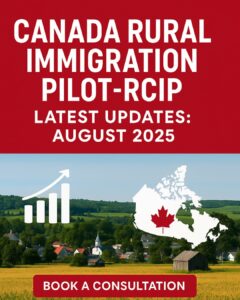
Canada Rural Immigration Pilot-RCIP Latest Updates: August 2025
Canada’s Rural Community Immigration Pilot (RCIP) has taken the immigration world by storm in 2025, with unprecedented demand from foreign nationals and employers alike.
Designed to address labour shortages in rural and remote communities, the RCIP offers a unique employer-driven pathway to permanent residencey.
However, the program’s popularity has led to significant changes, including tightened eligibility criteria, application pauses, and sector-specific restrictions in regions like North Okanagan-Shuswap, Peace Liard, Claresholm, Thunder Bay, and Sault Ste. Marie.
In this comprehensive guide, we dive into the latest RCIP updates, explore why demand is soaring, and provide actionable insights for applicants and employers navigating this evolving .
Table of Contents
- Latest RCIP Updates by Community
- Thunder Bay, Ontario
- North Okanagan-Shuswap, British Columbia
- Sault Ste. Marie, Ontario
- Peace Liard, British Columbia
- Claresholm, Alberta
- Why the High Demand for RCIP?
- Understanding the RCIP: A Permanent Residency Pathway
Latest RCIP Updates by Community
Thunder Bay, Ontario
Thunder Bay, the largest city in northwestern Ontario, has also adjusted its RCIP framework to manage demand.
For the month of August 2025, the Thunder Bay Community Economic Development Commission has paused recommendation applications for the Sales and Service sector, which includes roles like retail associates and customer service representatives.
This pause allows the commission to process existing applications and reassess capacity for September.
Thunder Bay’s decision highlights the challenges of balancing immigration with local labour market needs.
Applicants targeting Sales and Service roles should stay updated on the commission’s announcements, as the pause may lift in September.
Employers in other sectors, such as construction or healthcare, remain eligible to apply for designations, offering alternative opportunities for foreign nationals.
North Okanagan-Shuswap, British Columbia
As we previously reported, British Columbia’s North Okanagan-Shuswap region, the RCIP has seen extraordinary demand, with hundreds of applications flooding in during its first intake.
The region received applications far beyond its capacity, leading to the cancellation of the July 17, 2025, intake to address the backlog.
To streamline the process, North Okanagan-Shuswap has implemented stricter eligibility criteria, notably excluding employers in the fast food (NAIC 722512) and gas station (NAIC 4471) sectors due to “overwhelming demand and a limited number of recommendations.”
The community has scheduled three additional intake windows for 2025, offering hope for applicants who missed the initial round.
However, the exclusion of fast food and gas station employers signals a shift toward prioritizing other sectors, such as healthcare, agriculture, or skilled trades, which are critical to the region’s long-term growth.
Applicants and employers in North Okanagan-Shuswap should monitor the community’s official RCIP website for updates on intake schedules and eligible sectors.
Sault Ste. Marie, Ontario
In Sault Ste. Marie, Ontario, the RCIP has reached its capacity for specific sectors, leading to targeted restrictions.
As of May 8, 2025, the community no longer accepts designation requests from dine-in restaurants.
Additionally, as of June 3, 2025, Sault Ste. Marie has capped designations for employers hiring security supervisors.
These measures reflect the community’s effort to diversify its labour market and avoid over-reliance on specific industries.
For applicants, this means fewer opportunities in dine-in restaurants and security roles, but other sectors, such as manufacturing or tourism, remain viable.
Employers in capped sectors may face challenges in securing foreign talent through RCIP and should consult with the local economic development organization for guidance on alternative pathways.
Peace Liard, British Columbia
Peace Liard, another British Columbia community, has also faced intense demand for its RCIP program.
On August 1, 2025, the region’s first candidate intake reached its maximum application quota in under 10 minutes—a testament to the program’s popularity.
Similarly, Peace Liard hit its capacity for employer designation applications in July, prompting a pause on new designations until November 2025.
This temporary halt allows the local economic development organization to process existing applications and ensure a fair, sustainable approach to immigration.
For foreign nationals, the rapid closure of the August intake underscores the need for swift preparation and submission.
Employers in Peace Liard, meanwhile, must wait until November to apply for designation, potentially exploring alternative hiring strategies in the interim.
Claresholm, Alberta
In Claresholm, a small community in southern Alberta, the RCIP has been a game-changer for local businesses struggling to fill labour gaps.
However, as of July 24, 2025, Claresholm has stopped accepting or approving employer designation applications from the fast food subsector (NAIC 722512).
This decision reflects the community’s effort to balance immigration with economic priorities, focusing on sectors that align with long-term development goals.
For foreign nationals eyeing opportunities in Claresholm, this update narrows the pool of eligible employers.
Applicants should target roles in other industries, such as manufacturing or healthcare, and ensure their job offers meet the community’s endorsement criteria.
Employers in the fast food sector, meanwhile, may need to explore other immigration pathways, such as the Temporary Foreign Worker Program (TFWP), to meet their staffing needs.
Why the High Demand for RCIP?
The RCIP’s popularity in 2025 stems from several factors. First, Canada’s reputation as a welcoming destination for immigrants draws thousands of applicants seeking permanent residency.
The RCIP’s employer-driven model, which guarantees a job offer as a stepping stone to permanent residence, is particularly appealing for skilled workers from countries with limited immigration options.
Second, rural communities face chronic labour shortages in sectors like hospitality, retail, and agriculture, creating a high demand for foreign workers.
Unlike urban centres, where competition for jobs is fierce, rural areas offer a clearer path to employment and residency, making RCIP a magnet for global talent.
However, the surge in applications has strained local economic development organizations, which are responsible for vetting employers and endorsing job offers.
Limited recommendation quotas and administrative capacity have led to backlogs, prompting communities to tighten eligibility or pause intakes.
For foreign nationals, this underscores the importance of timing and preparation when applying for RCIP.
To address the overwhelming demand, RCIP communities have adopted various strategies.
North Okanagan-Shuswap and Claresholm have excluded fast food employers to focus on higher-priority sectors, while Peace Liard and Thunder Bay have implemented temporary pauses to manage application volumes.
Sault Ste. Marie’s sector-specific caps reflect a similar approach, ensuring a balanced labour market.
These measures aim to prevent system overload while maintaining the program’s integrity.
By prioritizing industries with long-term growth potential, communities are aligning RCIP with their economic development goals.
However, these changes also mean that applicants and employers must be strategic, targeting eligible sectors and preparing applications well in advance of intake windows.
Understanding the RCIP: A Permanent Residency Pathway
The Rural Community Immigration Pilot (RCIP) is a Canadian immigration initiative launched to bolster economic growth in rural and remote areas facing labour shortages.
Unlike urban-focused programs like Express Entry or the Provincial Nominee Program (PNP), the RCIP targets smaller communities, connecting foreign nationals with job opportunities in sectors critical to local economies, such as hospitality, retail, and agriculture.
To qualify for RCIP, foreign nationals must secure a full-time, permanent job offer from a designated employer within a participating community.
The job offer must also be endorsed by the local economic development organization, which assesses the employer’s eligibility and the community’s labour needs.
Once approved, candidates can apply for permanent residence, making RCIP an attractive option for those seeking a stable future in Canada.
The program’s appeal lies in its win-win structure: rural communities gain skilled workers to fill labour gaps, while foreign nationals achieve their dream of Canadian permanent residency.
The Canada Rural Community Immigration Pilot (RCIP) is transforming rural economies and offering life-changing opportunities for foreign nationals in 2025.
However, soaring demand has led to significant updates, including tightened eligibility, application pauses, and sector-specific restrictions in communities like North Okanagan-Shuswap, Peace Liard, Claresholm, Thunder Bay, and Sault Ste. Marie.
For applicants and employers, staying informed and acting strategically are key to success.
Check back for the latest updates, while preparing to seize this unique pathway to Canadian permanent residency.
